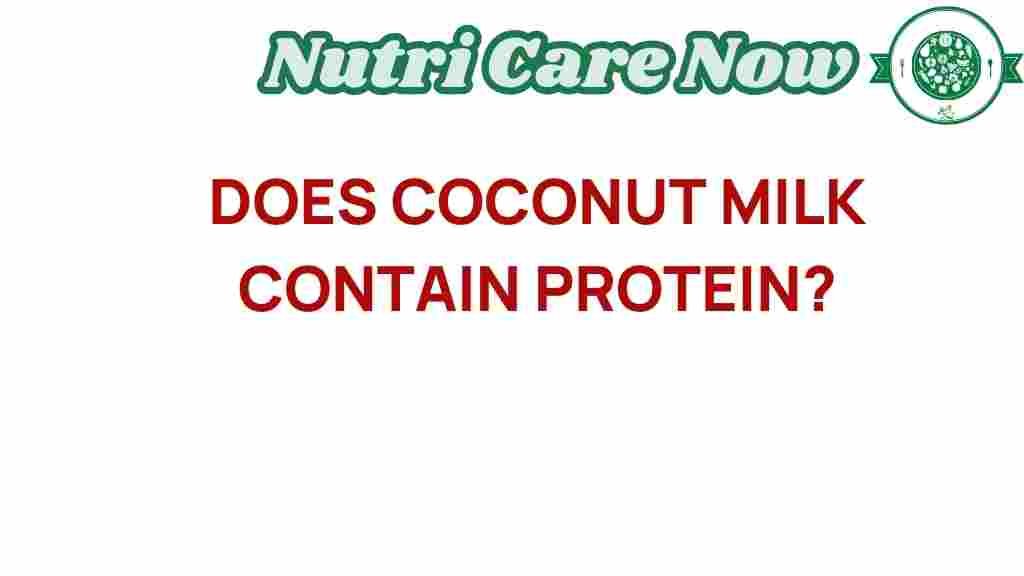Unveiling the Truth: Does Coconut Milk Really Contain Protein?
Coconut milk has become a staple in many kitchens, particularly for those following a plant-based diet. Known for its creamy texture and delightful flavor, it’s often used in smoothies, soups, and desserts. However, a common question arises among health-conscious individuals and those exploring vegan alternatives: does coconut milk really contain protein? In this article, we will delve into the protein content of coconut milk, its nutritional benefits, and how it fits into various dietary choices.
The Nutritional Profile of Coconut Milk
Coconut milk is derived from the flesh of mature coconuts. It is rich in fats, particularly medium-chain triglycerides (MCTs), but what about its protein content? Understanding its nutritional profile is crucial for anyone considering incorporating coconut milk into their diet.
Understanding Coconut Milk
Before assessing the protein content, let’s clarify what coconut milk is:
- Coconut Cream: This is the thick, rich layer that forms when coconut milk is processed. It has a higher fat content and lower water content.
- Coconut Milk: This is a mixture of coconut cream and water. It is thinner than coconut cream and is widely used in cooking.
In terms of nutrition, one cup (240 ml) of canned coconut milk typically contains:
- Calories: Approximately 445
- Fat: 48 grams (mostly saturated fat)
- Carbohydrates: 6 grams
- Fiber: 5 grams
- Protein: 5 grams
Protein Content in Coconut Milk
While coconut milk does contain some protein, it is important to note that the amount is relatively low compared to other plant-based milk alternatives. For reference:
- Almond Milk: Approximately 1 gram of protein per cup.
- Soy Milk: About 7 grams of protein per cup.
- Oat Milk: Roughly 2-3 grams of protein per cup.
This comparison shows that while coconut milk does provide some protein, it may not be the best source for those looking to increase their protein intake through their beverage choices.
Health Benefits of Coconut Milk
Despite its lower protein content, coconut milk offers a variety of health benefits, making it a popular choice among those on a plant-based diet.
Rich in Healthy Fats
Coconut milk is high in medium-chain triglycerides (MCTs), which are known for their potential health benefits, including:
- Boosting metabolism
- Supporting weight loss
- Providing quick energy
Vitamins and Minerals
Coconut milk is also a good source of several vital nutrients, including:
- Magnesium: Important for muscle and nerve function.
- Potassium: Essential for heart health and maintaining blood pressure.
- Iron: Crucial for red blood cell production.
These nutrients contribute to overall health and wellness, making coconut milk a valuable addition to your diet.
Incorporating Coconut Milk into Your Dietary Choices
For those following a plant-based diet or seeking vegan alternatives, coconut milk can be versatile. Here’s how to incorporate it into your dietary choices:
Cooking and Baking
Coconut milk can be used in a variety of recipes, including:
- Curries: It adds creaminess and flavor.
- Smoothies: Blend with fruits for a nutritious breakfast.
- Baked Goods: Use it as a dairy substitute in cakes and muffins.
As a Dairy Alternative
For those avoiding dairy, coconut milk serves as a great substitute for milk in coffee, cereals, and sauces. Its unique flavor can elevate many dishes.
Step-By-Step Guide to Making Coconut Milk at Home
Making coconut milk at home is simple and allows you to control the ingredients. Here’s a step-by-step guide:
What You’ll Need:
- 1 cup of shredded coconut (unsweetened)
- 4 cups of water
- Blender
- Nut milk bag or cheesecloth
Instructions:
- Blend: Combine shredded coconut and water in a blender. Blend on high for 2-3 minutes until well mixed.
- Strain: Pour the mixture through a nut milk bag or cheesecloth into a bowl. Squeeze out as much liquid as possible.
- Store: Transfer the coconut milk to a glass jar and refrigerate. Use within 3-5 days.
By making coconut milk at home, you ensure it is fresh and free from preservatives or additives.
Troubleshooting Tips
If you encounter issues when making or using coconut milk, consider the following tips:
- Separation: Coconut milk may separate in the can or jar. Simply shake or stir before using.
- Thick Consistency: If your coconut milk is too thick, dilute it with water until you reach your desired consistency.
- Flavor Adjustment: If the flavor is too strong, consider blending it with other milks or sweeteners.
Conclusion
In summary, coconut milk does contain protein, albeit in lower amounts compared to other plant-based milk alternatives. Its health benefits, primarily from healthy fats and essential nutrients, make it a worthy addition to many diets, particularly for those seeking vegan alternatives.
As you explore your dietary choices, consider how coconut milk can fit into your meals, whether in cooking, baking, or as a dairy substitute. By understanding its nutritional profile and benefits, you can make informed decisions that align with your health goals.
For more information about plant-based diets and nutrition, check out this comprehensive guide on plant-based eating.
Remember to experiment with coconut milk in your recipes and enjoy the rich flavors and benefits it brings to your plant-based lifestyle!
This article is in the category Diet and created by NutriCareNow Team
